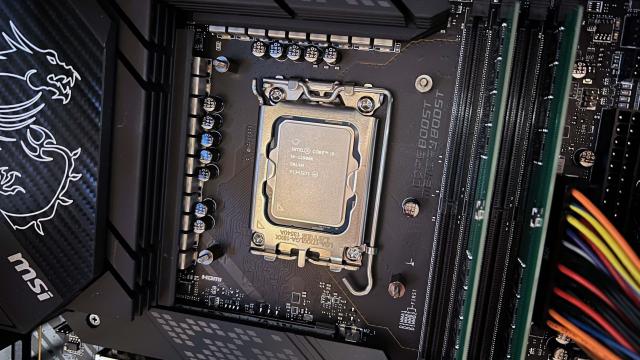Intel accidentally dropped details for its upcoming slate of desktop processors on its Canadian site, and though the company was quick to pull the specs, the Internet Archive has your back for those looking to see the original version.
The Intel Core i5-13600K’s looking at 14 cores and 20 threads while pushing up to 5.1 Ghz max frequency. The i7-13700K is 16 cores to 24 threads and 5.3 GHz, while the i9-13900K is rocking 24 cores, 32 threads and a 5.4 GHz frequency. With Turbo Boost Max 3.0 or Thermal Velocity Boost, assuming you have the appropriate power and cooling, you’ll be able to push to even high GHz counts.
These numbers aren’t too surprising, but they do help confirm earlier leaks. In leaked slides shown on igor’sLAB, the 13th gen CPUs previously seemed to have scaled cores and threads compared to the 12th gen. Intel has promised that, along with the speeds shown here, it’s also increased the L2 cache and L3 Intel Smart Cache on i5K processors and above. Of course, the new chipsets will support CPU PCIe 5.0 interfaces up to 16 lanes and continue facilitating DDR5 and DDR4 RAM, though they will now go up to DDR5-5600 compared to the 12th gen’s limit of DDR5-4800. The previously leaked SKU chart slide gives a good rundown of what’s going on here.
Intel accidentally confirmed 13th gen specs
i9 13900K : 24C 32T / P 5.4G Max
i7 13700K : 16C 24T / P 5.3G Max
i5 13600K : 14C 20T / P 5.1G MaxConfirm @IgorWallossek ‘s post is right
Everyone knows it, right? 🙃 https://t.co/StZjFhxkUU pic.twitter.com/XD5IHaLRDH
— 포시포시 (@harukaze5719) September 12, 2022
Beyond the eye-catching boasts of increased cores and threads, there isn’t a big killer feature here over what’s on the current 12th gen Alder Lake series, which made waves by introducing DDR5 support. In our own review of the 12th gen chips, we already felt Alder Lake was pretty damned future-proof, supporting PCIe Gen5 and Thunderbolt 4. And considering you’ll need to drop between $US280 ($389) to $US590 ($819) for any of the new mid-to-high end CPUs, these hybrid chips are going to be a big ask for many users out there.
And, of course, AMD has already rolled up to the corner, putting Intel on blast with its own upcoming Zen 4 CPU lineup, available at the end of this month. AMD’s claiming that its 7000 series chips will also allow boost clocks of over 5 Ghz to match Intel, as well as support for PCIe5 and DDR5. It’s hard to judge their speeds versus Intel CPUs just based on cores and clock speeds, as we’re only working with pre-release material. What’s most important is pricing, with the highest end Ryzen 9 7950X costing $US699 ($970) at launch. A top-of-the-line Core i9-12900K runs over $US100 ($139) cheaper, so eyes are on Intel for how it prices Raptor Lake.
AMD also won’t have a 7800X CPU at launch, Sept. 27, which means that when it does eventually put out its mid-range CPU version, it’ll likely compete more with Intel’s 13th gen then it will with the 12th gen. And since you’ll likely need to upgrade your motherboard to support this new slate of gaming-ready CPUs, users will have an even bigger decision to make.
There’s some argument for further future-proofing your computer hardware, but we still don’t know pricing for those upcoming 13th gen processors or their release window. That, in my mind, is going to be the main deciding factor in whether there’s any reason to hold off upgrading if you haven’t already gone for a 12th gen and you’re absolutely set on Intel CPUs. And if you already have dropped several Benjamins on new chips, I have serious doubts that digging deeper into your wallet for the 13th gen will result in the kind of performance gains that demand spending even more right away.
